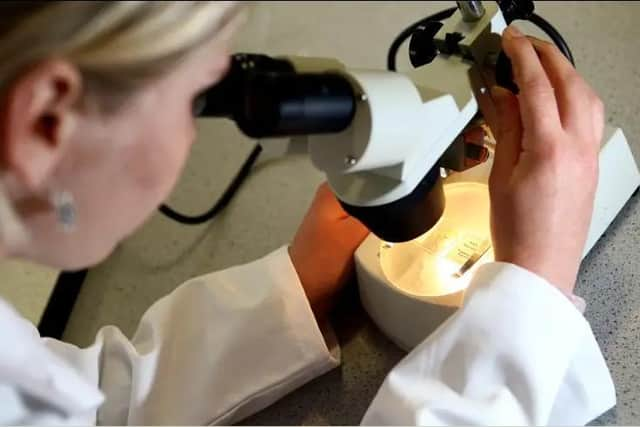Hundreds of cancers discovered at most deadly stage in Herts Valleys CCG area
and live on Freeview channel 276
Hundreds of cancers are not discovered until they have progressed to the most deadly stage of illness in the Herts Valleys CCG area, new figures show.
A "cancer catastrophe" could be on the cards if more is not done to reduce the number of people receiving late diagnoses, according to charity Cancer Research UK.
Advertisement
Hide AdAdvertisement
Hide AdTens of thousands of cancer cases reached the most severe stage of illness before being detected across England in 2019 – the most recent figures available from NHS Digital.


At least 554 cases diagnosed by medics in the NHS Herts Valleys CCG area had reached an advanced stage at the point of diagnosis that year.
Herts Valleys CCG is urging residents to talk to their GP if something is worrying them.
A Herts Valleys spokesperson said: "Earlier and faster cancer diagnosis is a key priority in Herts Valley CCG and this has become even more important during the pandemic.
Advertisement
Hide AdAdvertisement
Hide Ad"As we saw nationally, fewer people attended their GP with worrying symptoms during lockdown. If something feels wrong or is worrying you, then talk to your GP.
"It’s always best to get things checked, and most of the time it will turn out to be nothing to worry about. Further information can be found on our website.
"We can see that there is now a higher-than-usual number of referrals.
"However, there is more to do, and in west Hertfordshire, we want to increase the numbers of patients being diagnosed at an early stage.
Advertisement
Hide AdAdvertisement
Hide Ad"For example, Herts Valleys is developing new services for patients with non-specific symptoms which could indicate cancer.
"We launched a 12-month pilot of a primary care-led ‘vague symptoms’ pathway with direct access to CT scanning. This began in 2021 and is likely to be extended."
Cancer Research UK said there are concerns that survival rates could "go backwards" as a result of the coronavirus pandemic's impact upon the NHS.
Before cancer patients embark upon treatment, doctors commonly use staging techniques to establish how severe the disease is and how far it has spread.
Advertisement
Hide AdAdvertisement
Hide AdThe stages, which range in severity from zero to four, are used to describe the size of tumours and to determine how far the cancer has spread from where it originated.
There were 3,063 cancers diagnosed in Herts Valley in 2019 and stage four diagnoses, which carry the greatest mortality risk, represented 25% of those with a valid stage identified.
That was around the same as recorded the year before.
Figures for CCGs across England show some cancers are far more likely to be diagnosed late than others, with those affecting the pancreas, lungs and oesophagus among those the most likely to be detected at an advanced stage – often because they do not cause symptoms until a later stage.
They are among those represented by the Less Survivable Cancers Taskforce, which launched in 2017.
Advertisement
Hide AdAdvertisement
Hide AdThe taskforce, made up of six different charities, is launching its first awareness day on January 11 to highlight the importance of early diagnosis in improving survival rates.
In the area covered by the NHS Herts Valleys CCG, 44% of the 344 lung cancers detected in 2019 were at stage four when found, as were 55% of 100 pancreatic cancers and 28 of 80 oesophageal cases.
Patients diagnosed at the earliest stage are between five and 10 times more likely to survive at least five years compared to those diagnosed at stage four.
Dr Jodie Moffat, head of early diagnosis at Cancer Research UK, said reducing the number of people diagnosed with advanced disease was crucial to saving lives and swift action was needed from the Government and NHS.
Advertisement
Hide AdAdvertisement
Hide AdDr Moffatt added: “Many factors can impact late diagnoses, and Covid has affected many of these, such as how readily people come forward with symptoms, or how long people need to wait for tests.
"Worryingly, waits for a cancer diagnosis and treatment were struggling well before the pandemic hit.
"Chronic shortages in staff and equipment mean cancer waiting times have been missed for years."
An NHS spokeswoman said the health service was committed to ensuring that 75% of cancers are detected at stage one by 2028, adding that 95% of those diagnosed since March 2020 began treatment within a month.
A Department of Health and Social Care spokesman said cancer diagnosis and treatment is a priority for the Government, adding that £10 billion was being invested in cutting waiting times.
